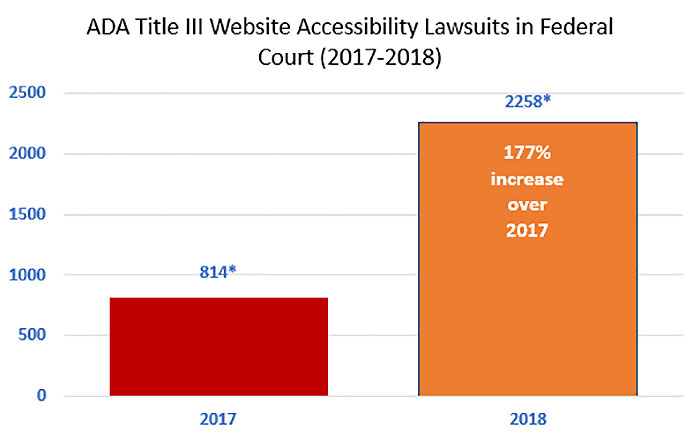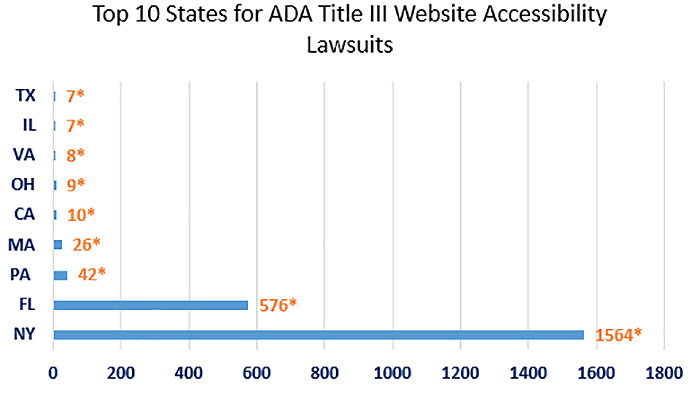Frivolous Lawsuit Concern
We’ve heard recently from some clients concerned about frivolous lawsuits for website ADA non-compliance. We had explored the issue of ADA compliance in-depth last December in our Insight, “Is Your Website ADA Compliant?” but had not addressed the frivolous aspect of some of these lawsuits. Below is a closer look.
ADA Compliance Lawsuits On the Rise
According to the law firm, Seyfarth Shaw, accessibility lawsuits filed in federal court nearly tripled to 2,258 in 2018 from 814 in 2017.

What’s more is that the state with the highest filing was New York, with a total of 1,564, or over 2/3 of all lawsuits filed.

What Is behind these Lawsuits?
With this rapid increase in the number of lawsuits, some have wondered just who gains from them. As pointed out in an excellent article by Essential Accessibility:
"…when plaintiffs file federal lawsuits under the ADA, they cannot sue for monetary damages. They can only seek reimbursement of their legal fees as well as remediation of the inaccessibility in question. Clearly, they aren’t launching litigation because they’re looking for some quick cash. The reason they sue is to compel a business that has been in violation of federal law to change its discriminatory practices."
This is a powerful point. What most of us take for granted, such as finding out our latest bank balance or ordering food online, can become problematic for a person with disabilities checking a website that is not ADA-compliant. There is nothing frivolous about this.
So why then even raise the specter of such lawsuits as frivolous?
The issue seems to be that, while plaintiffs do not see a monetary gain, the lawyers representing them do—through the reimbursement of legal fees. And when you take note that most of the 1,564 lawsuits filed last year in New York were filed by only 15 law firms/lawyers, motivation can be inferred and it's easy to see why someone might be concerned about getting hit with a frivolous lawsuit.
Are Proposed Laws to Curtail Frivolous Lawsuits Reasonable?
Back in February 2018, the House of Representatives had passed the ADA Education and Reform Act (or H.R. 620). The bill required those who filed a suit in federal court to allow a business 60 days to devise a plan to fix the compliance problem and another 120 days to implement it. Under the threat of filibuster, the bill never made it to the Senate floor.
Proponents of H.R. 620 – and other legislation like it, such as the proposed New York State Notice and Cure Bill – argue such measures would cut down the number of frivolous lawsuits.
On the face of it, such laws seem reasonable, but while it may seem fair to give a business time to rectify any non-compliance issues, such laws have been cited by many disability and civil rights groups as potentially weakening business incentive to comply with the Americans With Disabilities Act of 1990 (ADA) in the first place.
The argument here is that website compliance is just another aspect of doing business, such as paying taxes or providing a safe work environment: a business should already be aware of what the law is and conform with it—not wait until someone else has cited their non-conformance.
But Just What Are the ADA Compliance Standards?
Another reason some worry about getting hit by a frivolous lawsuit is the vagueness of just what an ADA-compliant website is. Currently, there is no government oversight agency that has set rules or even guidelines for website ADA compliance. So how does a business know if it is compliant or not?
What has been used by courts so far has been the Web Content Accessibility Guidelines (WCAG), developed by the World Wide Web Consortium (W3C), an international standards organization for the web. The W3C breaks adherence of these guidelines into three levels of conformance.
Levels of Conformance
- “A”: A website must meet these standards, or one or more groups will find it impossible to access the content
- “AA”: A website should meet these standards, or some groups will not be able to access the content
- “AAA”: A website may meet these standards for some groups to have even greater accessibility of the content
Adherence to the W3C “A” and “AA” levels has usually been enough to show compliance in the above lawsuits, but, that said, the environment keeps evolving. For instance, the W3C updated their accessibility standards in the WCAG to 2.1 last July. So even if your site was compliant when made, it may not be now.
Practical Remedy for Those Concerned—Periodic Audits for ADA Compliance
Given the rise of lawsuits and the evolving nature of compliance, we think it practical to have your website periodically audited for ADA Compliance. We recommend bi-annual auditing and re-certification.
For Our Clients
As such, for our clients, we recently deployed an ADA Compliance Checker integrated into Animus Rex Cloud CMS, so our clients can spot-check their site at any point to see if they are compliant.
Also, we are happy to perform an ADA audit, mitigate any found issues and issue (or re-issue) an ADA Compliance Certificate. Because we use good coding practices when creating sites, audits typically turn up very little, and, if done regularly, re-certifications (recommended every 6 months) are quick and painless, even with the more advanced standards that came out in July 2018.
If you're interested, please make a normal production request to start the process.
For Others
For websites we have not developed, we (or other competent firms) can perform an ADA audit and issue written recommendations that you can take to your development team for remediation. Once complete, the site will be retested until confirmed compliant at which point an ADA Compliance Certificate will be issued. Please contact us for more information if you’re interested.
ADA Awareness Is a Better Web for All
The rising tide of these lawsuits – frivolous or legitimate – has made it clear the ADA Compliance issue will not go away any time soon. While future laws may come into effect to curtail non-legitimate claims, the most practical solution is to stay aware of the latest website ADA compliance guidelines and do periodic audits.
We, at Animus Rex, have always built our client websites with an emphasis on accessibility. We do this for two very good reasons:
- It’s the smart thing to do. With about 25% of American adults having some form of disability, ADA Compliance increases a company’s potential client or customer base. Also, most accessibility issues addressed correctly on a website typically help it to rank better on search engines.
- Most importantly, it’s just the right thing to do. Everyone should have access to a business’ info or services.
Have questions? Contact us.
Thanks and be well,
~Your Friendly Animus Rex Team